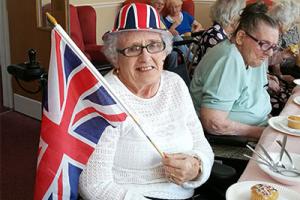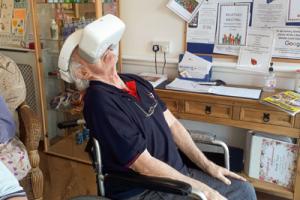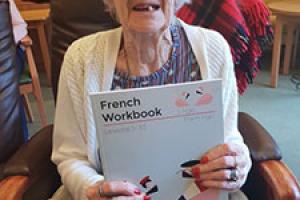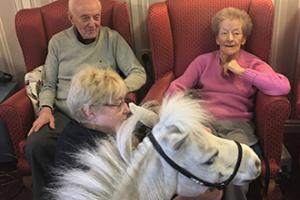…
Rebuilding lives with Doll Therapy
A care home in Leeds is helping many of its residents with dementia to take part in daily activities, rebuild their sense of purpose and create opportunities for meaningful conversations with the help of doll therapy.
Residents at Paisley Lodge, an Orchard Care Home based in Armley, now benefit from a specialist doll therapy area, thanks to the ongoing support of a partnership with Nestlé Professional, which enhances the 45-bed home’s specialist dementia care. A form of reminiscence therapy, doll therapy is designed to revive memories of parental responsibility in those living with dementia.
As many as 60-90% of older people experience the distressing symptoms of Alzheimer’s or dementia, and therapy dolls have been shown to be extremely effective in helping to reduce this. Doll Therapy was first introduced at Paisley Lodge when one of its residents had regressed into childhood and did not recognise that her children had grown up. Her behaviour become erratic and she was hostile to staff and her loved ones when they tried to explain that her children were now adults.
Home Manager Pat Woellner knew of the immense benefits that doll therapy can provide and introduced the resident to a life-like baby doll, who she was able to hold and care for. The new sense of responsibility and identity recreated the resident’s memories of being a mum and enabled her to share precious memories with family, staff and fellow residents. She became content and happy with her surroundings. This dramatic change in behaviour and the impact the doll therapy had, not only residents but also staff, has led to the introduction of other baby items in the home, such as a nursery with pushchairs, prams, baby equipment, and even a babysitting service.
All too often, people with dementia become isolated in their own world and don’t recognise their loved ones, which is distressing for everyone. Doll therapy can offer a chance for them to regain a sense of purpose, caring for their charges and chatting to fellow residents and staff about their daily 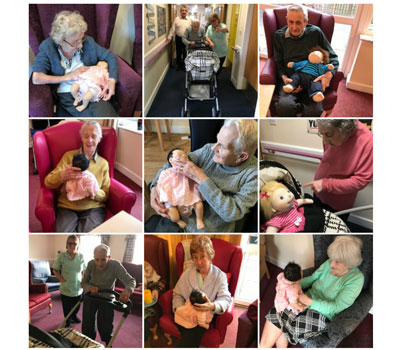 routines. It can also provide comfort and safety for residents experiencing grief from a loss of their partner.
routines. It can also provide comfort and safety for residents experiencing grief from a loss of their partner.
Pat notes: "One of our residents lost her husband, and the doll helped her to go through the grieving stages.” Caregivers sometimes report that when a loved one is holding a doll they are able to more easily provide care to their family member or resident because of the distraction and comfort the doll provides. Additionally, doll therapy is a non-pharmacologic way to address challenging emotions and behaviours that may develop in dementia. There are no medication side effects or drug interactions with doll therapy, and no cost to the NHS for medication.
Pat Woellner, who has worked in the care sector for over 30 years, is passionate about the benefits that doll therapy brings to people living with dementia. “People with dementia are often anxious about their surroundings, the people with whom they interact and their own abilities. This can often result in agitation, poor appetite, loneliness and boredom. We have seen the dramatic changes that this therapy brings to our residents. In one case a lady who had been receiving treatment by specialist mental health services for challenging behaviour was discharged by her consultant after just 3 months because the doll therapy had made such a positive change to her behaviour. It’s not just women that benefit from doll therapy. Two of our male residents have enjoyed looking after them too. Now it’s a regular occurrence to see them pushing prams along the corridors, stopping to chat to staff and fellow residents about their "baby" and reliving their memories of bringing up their own children. I often hold a doll on my hip when doing my walk around the home to check everyone is happy, as it is a great way to start a conversation with residents who may otherwise not wish to engage.”
Before Pat introduced doll therapy to the home she invited the families of residents to a meeting, explaining the pros and cons and provided them with information sheets, to gauge their feelings - almost all were supportive to its introduction to their loved ones. All the staff bought into the initiative and went out of their way to ensure they spent time with residents when they had their dolls, listening to them and sharing memories of their own family lives.
Pat concluded “We now have 15 dolls in the home that are being used by residents and each doll is unique, to suit various individual’s needs. We have changing stations, pushchairs, feeding equipment and highchairs." Staff and residents at Paisley Lodge certainly have a much stronger bond since the introduction of doll therapy and this common interest allows them to share opinions and memories about the many skills needed to raise children, and all the stories that accompany them, on a regular basis.


